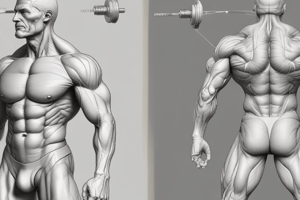Podcast
Questions and Answers
Match the physical activity with its description:
Match the physical activity with its description:
Stretching = Loosens muscles Exercise = 30 minutes of running or dancing Yoga = Simple poses like tree pose Warm-up = Stretch before sports
Match the healthy habit with its importance:
Match the healthy habit with its importance:
Hydration = Drink 8-10 glasses of water Balanced diet = Rich in protein, calcium, and vitamins Sleep = 8-10 hours of rest nightly Safety gear = Wear protective equipment during activities
Match the fun reminder with its activity:
Match the fun reminder with its activity:
Muscle Chart = Track progress Healthy Plate = Create a poster of nutritious foods Stretching Routine = Design a schedule for stretches Role-play = Act out different exercises
Match the real-life application with its example:
Match the real-life application with its example:
Match the teacher guidance with its action:
Match the teacher guidance with its action:
Flashcards
Stretching
Stretching
Making your muscles longer and more flexible by gently moving them, like reaching your arms above your head.
Exercise
Exercise
Activities like running, jumping, or dancing to keep your muscles strong and healthy.
Hydration
Hydration
Drinking enough water to keep your body functioning properly, like your muscles working smoothly.
Balanced Diet
Balanced Diet
Signup and view all the flashcards
Sleep
Sleep
Signup and view all the flashcards
Study Notes
Taking Care of Your Muscles
- Physical Activities: Stretching, exercising, and yoga are important to keep muscles flexible and strong.
- Stretching: Stretching your arms, legs, and back loosens muscles.
- Exercise: Daily exercise like running, jumping, or dancing (30 minutes) strengthens muscles.
- Yoga: Simple poses like "tree pose" and "downward-facing dog" improve flexibility and strength.
Healthy Habits for Muscle Health
- Hydration: Drink plenty of water (8-10 glasses daily). Water helps muscles function.
- Balanced Diet: Eat foods rich in protein (chicken, fish), calcium (dairy products), and vitamins (fruits and vegetables) to support muscle growth and repair.
- Sleep: Getting 8-10 hours of sleep each night allows muscles to recover and rebuild.
Preventing Muscle Injuries
- Warm-up: Always stretch before playing sports to prevent injuries.
- Safety Gear: Use helmets, knee pads, and elbow pads when participating in activities that could cause injuries.
- Listen to Your Body: Rest if you feel any muscle pain. This avoids further damage.
Fun Ways to Learn
- Muscle Chart: Create a chart to track your progress in stretching and exercise.
- Healthy Plate Poster: Make a poster demonstrating how to create healthy meals that help your muscles.
- Stretching Routine Schedule: Create a schedule for daily stretching.
Interactive Learning Activities
- Model the Muscular System: Use clay or playdough to create a model of the muscular system.
- Draw and Label Muscles: Draw and label major muscles in the body.
- Role-Play: Act out different exercises and stretches to better understand them.
Real-Life Muscle Care
- Household Chores: Help with chores like carrying groceries to strengthen muscles.
- School Sports/Clubs: Participate in school sports or clubs to stay active.
- Pet Care: Taking care of pets (for example, walking dogs) is a good way to exercise.
Learning Resources
- National Geographic Kids: Provides videos and articles about the human body, including the muscular system.
- BrainPOP: Offers animated tutorials about the muscular and other systems.
- KidsHealth: Provides interactive websites with information on health topics.
Teacher Guidance
- Demonstrate Exercises/Stretches: Teachers should show proper techniques for exercises and stretches.
- Provide Educational Materials: Teachers should supply learning tools to help students.
- Reflection Journals: Encourage students to record their experiences and thoughts about muscle care.
Studying That Suits You
Use AI to generate personalized quizzes and flashcards to suit your learning preferences.




